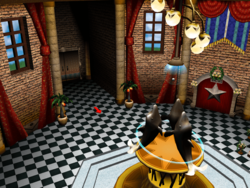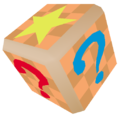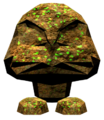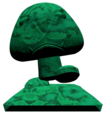NDDEMO: Difference between revisions
(fix typo, link to higher quality gameplay footage, clarify "NDDEMO" meaning) |
Somethingone (talk | contribs) m (I don't think that is what Hover is for.) Tag: Mobile edit |
||
| Line 13: | Line 13: | ||
|input={{input|gcn=1}} | |input={{input|gcn=1}} | ||
}} | }} | ||
'''''NDDEMO'''''<ref>[https://imgur.com/a/QJ9HMUR Nintendo GameCube SDK documentation]</ref> (short for "Nintendo Developer Demo"; known informally as '''''Peach's Castle''''', and referred to in-game as '''''Welcome to GameCube World!!''''') is a 2001 interactive [[tech demo]]<ref>[http://www.unseen64.net/2009/03/01/peachs-castle-gamecube-tech-demo/ Unseen64 Peach's Castle Demo Information]</ref> included in the software development kit for the [[Nintendo GameCube]], created to show developers the system's graphical capabilities. | |||
In the demo, the player controls a red arrow that can navigate various rooms in [[Peach's Castle]] from ''[[Super Mario 64]]'', with each room demonstrating a different graphical effect, such as bump mapping, anti-aliasing, or environment mapping. | In the demo, the player controls a red arrow that can navigate various rooms in [[Peach's Castle]] from ''[[Super Mario 64]]'', with each room demonstrating a different graphical effect, such as bump mapping, anti-aliasing, or environment mapping. | ||
Revision as of 22:10, April 10, 2024
- This article is about the GameCube tech demo. For other uses of "Peach's Castle", see Peach's Castle (disambiguation).
| NDDEMO | |
|---|---|

| |
| Developer | Nintendo EAD |
| Publisher | Nintendo |
| Platform(s) | Nintendo GameCube |
| Release date | 2001[?] |
| Genre | Platformer |
| Rating(s) | Not rated |
| Mode(s) | Single player |
| Input | Nintendo GameCube:
|
NDDEMO[1] (short for "Nintendo Developer Demo"; known informally as Peach's Castle, and referred to in-game as Welcome to GameCube World!!) is a 2001 interactive tech demo[2] included in the software development kit for the Nintendo GameCube, created to show developers the system's graphical capabilities.
In the demo, the player controls a red arrow that can navigate various rooms in Peach's Castle from Super Mario 64, with each room demonstrating a different graphical effect, such as bump mapping, anti-aliasing, or environment mapping.
Rooms
#0 Peach Castel - ENTRANCE
The main hub area featuring 6 doors, 5 of which lead to other rooms. This room features several animated objects throughout, as well as a map of the Castle at the center of the bottom floor.
#1 Huge Texture - DOME
A small room with floral and mountain-themed murals on the walls. The floor has a Super Star with a flower in the background, which is revealed to be made of a small, repeating texture of three stars when looked at closely.
This room demonstrates the GameCube's support for large, high-resolution textures, as well as mipmapping.
#2 Bump & Shadow - SPIRAL STAIRCASE
A dimly-lit area with a colored stone pillar and spiral staircase in the center. Once the player reaches the stairs, the red arrow begins bouncing, and the player can lead it to the bottom of the room, where a door leading to the Hangar can be found.
This room features bump mapping, a method of simulating bumps and wrinkles on an object's surface.
#3 Antialiasing - HANGAR
An indoor hangar with a biplane. Next to it, the player can find a metal Warp Pipe which leads to the Cave. This room demonstrates the GameCube's anti-aliasing functionality, most prominently with the wire-mesh fences.
#4 Local Lighting - CAVE
A cave featuring a wooden bridge which leads to a Goomba statue, with some bulbs and colored projector lights illuminating the path. This room demonstrates the GameCube's real-time lighting capabilities, with lights and casted shadows updating to reflect their source's position.
Entering the green Warp Pipe at the beginning of the area takes the player to the top floor of the Entrance.
#5 Projection Texture - CINEMA THEATER
A small screening room where a short looping video (featuring prototype GameCube consoles of various colors), along with a blue star and pink heart, are projected and moved around the room.
This area demonstrates projected textures, which can be animated, overlayed on top of each other, and projected over many objects in real-time.
#6 Environment Mapping - METAL MARIO !!
A small room featuring a large Metal Mario statue that reflects its surroundings, meant to demonstrate environment mapping.
#7 Maximum POLYGONS - How Many COINS?
A white room with a ? Block at the center. Pressing ![]() while underneath will release a large amount of differently-colored Coins and stars. This room demonstrates the large amount of polygons, models, and objects that the GameCube can process and display at once.
while underneath will release a large amount of differently-colored Coins and stars. This room demonstrates the large amount of polygons, models, and objects that the GameCube can process and display at once.
The player can use ![]() to adjust how many coins appear when the ? Block is hit, up to 1024 at once;
to adjust how many coins appear when the ? Block is hit, up to 1024 at once; ![]() and
and ![]() increase and decrease the amount by 20, while
increase and decrease the amount by 20, while ![]() and
and ![]() increase and decrease by 1. The exact amount can be viewed by enabling "System Info" in the pause menu.
increase and decrease by 1. The exact amount can be viewed by enabling "System Info" in the pause menu.
Pressing ![]() exits the room; as such, camera control mode is activated by pressing
exits the room; as such, camera control mode is activated by pressing ![]() instead.
instead.
Features
Camera Control Mode
By pressing ![]() , the player can freely control the camera's angle and position.
, the player can freely control the camera's angle and position. ![]() adjusts the camera's position, and
adjusts the camera's position, and ![]() controls its angle; pressing
controls its angle; pressing ![]() or
or ![]() raises and lowers it respectively. Pressing
raises and lowers it respectively. Pressing ![]() again returns to the arrow.
again returns to the arrow.
Wireframe Mode
Pressing ![]() enables a wireframe display mode, hiding textures and making the edges of polygons more distinct.
enables a wireframe display mode, hiding textures and making the edges of polygons more distinct.
The wireframe mode causes reduced performance (as shown on the resource usage meter), most noticeably in the Entrance and How Many Coins? rooms.
Pause Menu
Pressing ![]() opens the pause menu; here, the player can toggle mipmap levels, the GameCube's output resolution, system debug information, a resource usage meter, gamma levels, background music, and sound effects.
opens the pause menu; here, the player can toggle mipmap levels, the GameCube's output resolution, system debug information, a resource usage meter, gamma levels, background music, and sound effects.
The player may also access the main menu, where two modes are selectable: Normal Demo (default; the player controls the red arrow to explore the castle), or Auto Demo (the camera is controlled automatically, cycling through the different rooms). Additionally, individual rooms can be selected for either mode.
Doors
When the player reaches a door, the arrow will "knock" on the door until the corresponding room is finished loading. To reduce load times, the room the player is meant to enter next is loaded ahead of time, indicated by the star on the door being yellow instead of stone-gray.
Controls
 - Jump in How Many Coins?, pause/resume in Auto Demo
- Jump in How Many Coins?, pause/resume in Auto Demo - Enter camera control mode, exit room in How Many Coins?
- Enter camera control mode, exit room in How Many Coins? - Enter camera control mode in How Many Coins?, slowly advance scene when paused in Auto Demo
- Enter camera control mode in How Many Coins?, slowly advance scene when paused in Auto Demo - Enter wireframe mode, slowly rewind scene when paused in Auto Demo
- Enter wireframe mode, slowly rewind scene when paused in Auto Demo - Raise the camera in camera control mode, rewind in Auto Demo
- Raise the camera in camera control mode, rewind in Auto Demo - Reset the camera behind the player, lower the camera in camera control mode, fast-forward in Auto Demo
- Reset the camera behind the player, lower the camera in camera control mode, fast-forward in Auto Demo - Enter pause menu
- Enter pause menu - Move the arrow, adjust the camera's position in camera control mode
- Move the arrow, adjust the camera's position in camera control mode - Rotate the camera around the player, adjust the camera's angle in camera control mode
- Rotate the camera around the player, adjust the camera's angle in camera control mode - Adjust how many coins appear when the ? Block is hit in How Many Coins?
- Adjust how many coins appear when the ? Block is hit in How Many Coins?
Gallery
Screenshots
Sprites and Models
Goomba rock formation
Media
| File info 0:30 |
| File info 0:30 |
| File info 0:30 |
| File info 0:30 |
| File info 0:30 |
| File info 0:30 |
| File info 0:30 |
| File info 0:30 |










